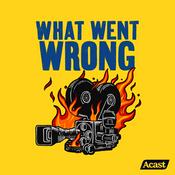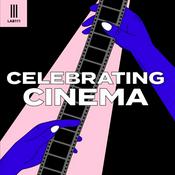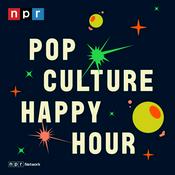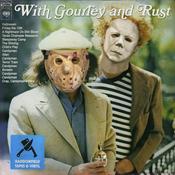267 afleveringen
- If you like You Must Remember This, you might also enjoy Cautionary Tales with Tim Harford, a
podcast about stories of historic human error, catastrophes, and heists, and the lessons we can
learn from such mishaps. In this episode of Cautionary Tales, Tim examines what happens when the bright lights of Hollywood collide with the far less glamorous world of tax evasion.
When Ernest Borgnine was cast as the lead in the 1955 romantic drama, Marty, he thought it
was his big break. But he soon discovered Marty was not exactly a dream gig. Listen to
Cautionary Tales every Friday wherever you get your podcasts.
To learn more about listener data and our privacy practices visit: https://www.audacyinc.com/privacy-policy
Learn more about your ad choices. Visit https://podcastchoices.com/adchoices Welcome to Hollywoodland: John Waters: Subversion, Shock, and the Ultimate Outsider
02-5-2025 | 38 Min.If you’ve finished all episodes of The Old Man is Still Alive, I’ve got another treat for you from Jake Brennan at Hollywoodland. Have a listen to this episode of Hollywoodland about John Waters, from his beginnings in X-rated art films to cult classics like Hairspray and Crybaby, as he created and cultivated his own peculiar niche in film while nurturing a legendary troupe of players who became a family of outcasts.
To learn more about listener data and our privacy practices visit: https://www.audacyinc.com/privacy-policy
Learn more about your ad choices. Visit https://podcastchoices.com/adchoices- In part two of our season finale, we explore the final decade of John Huston’s life and career. As he was slowly dying of emphysema and undergoing massive turmoil in his personal life, Huston continued to work almost compulsively on both passion projects (The Man Who Would Be King, Wise Blood, Under the Volcano) and paycheck gigs (Annie). His career ended, fittingly, with two collaborations with the next generation of Hustons, Prizzi’s Honor and The Dead.
To learn more about listener data and our privacy practices visit: https://www.audacyinc.com/privacy-policy
Learn more about your ad choices. Visit https://podcastchoices.com/adchoices - This series began with the story of a director who wrote his autobiography to secure his place in history after his career had gone down the drain. It ends with the story of a man who wrote his autobiography as a “dead man walking”...and then continued to make movies for another half a decade, until the literal last breath left his body. Hollywood’s original “nepo baby” director, John Huston was never a conventional studio system stalwart, and in some respects he was able to go with the flow of changing times a lot better than some of his contemporaries. In part one of our two-part season finale we’ll talk about his flight from Hollywood to Ireland, literally playing God, Huston’s long fallow period in the late 60s, Anjelica Huston’s misbegotten film debut, Huston’s reinvention in the New Hollywood era and the health crisis that almost ended it all.
To learn more about listener data and our privacy practices visit: https://www.audacyinc.com/privacy-policy
Learn more about your ad choices. Visit https://podcastchoices.com/adchoices - This episode was originally released on March 3, 2015. Listen to help prep for the next episode of our new season, The Old Man is Still Alive.
She was the raven-haired beauty whose lily-white persona was forged by her supporting roles in Gone With the Wind and several Errol Flynn swashbucklers. He was the real-life swashbuckler, the heroic lover/drinker/fighter whose directorial debut The Maltese Falcon, was an enormous success. They met when Huston directed de Havilland in his second film, In This Our Life, and began an affair which would continue, on and off, through the decade, as he joined the Army and made several controversial documentaries exposing dark aspects of the war experience, and as she waged a war of her own, taking Warner Brothers to court to challenge the indentured servitude of the star contract system. De Havilland’s lawsuit went all the way to the California Supreme Court, and had massive implications on the future of labor in Hollywood and beyond.
To learn more about listener data and our privacy practices visit: https://www.audacyinc.com/privacy-policy
Learn more about your ad choices. Visit https://podcastchoices.com/adchoices
Meer TV & film podcasts
Trending TV & film -podcasts
Over You Must Remember This
You Must Remember This is a storytelling podcast exploring the secret and/or forgotten histories of Hollywood’s first century. It’s the brainchild and passion project of Karina Longworth (founder of Cinematical.com, former film critic for LA Weekly), who writes, narrates, records and edits each episode. It is a heavily-researched work of creative nonfiction: navigating through conflicting reports, mythology, and institutionalized spin, Karina tries to sort out what really happened behind the films, stars and scandals of the 20th century.
Podcast websiteLuister naar You Must Remember This, WHAT WENT WRONG en vele andere podcasts van over de hele wereld met de radio.net-app
Ontvang de gratis radio.net app
- Zenders en podcasts om te bookmarken
- Streamen via Wi-Fi of Bluetooth
- Ondersteunt Carplay & Android Auto
- Veel andere app-functies
Ontvang de gratis radio.net app
- Zenders en podcasts om te bookmarken
- Streamen via Wi-Fi of Bluetooth
- Ondersteunt Carplay & Android Auto
- Veel andere app-functies

You Must Remember This
Scan de code,
download de app,
luisteren.
download de app,
luisteren.





































